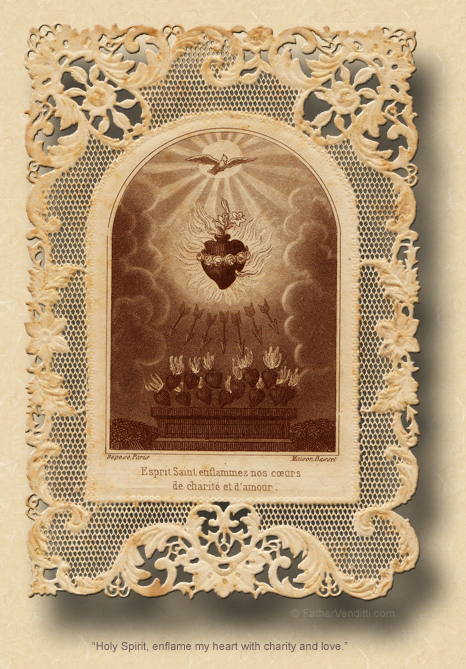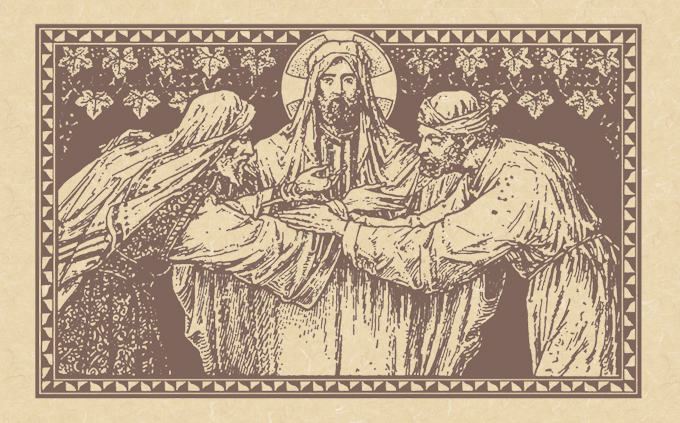A Bitter Pill to Swallow.
The Seventh Sunday of Ordinary Time.
Lessons from the primary dominica, according to the ordinary form of the Roman Rite:
• Leviticus 19: 1-2, 17-18.
• Psalm 103: 1-4, 8, 10, 12-13.
• I Corinthians 3: 16-23.
• Matthew 5: 38-48.
Sexagesima Sunday.*
Lessons from the dominica, according to the extraordinary form of the Roman Rite:
• II Corinthians 11: 19-33; 12: 1-9.
• [Gradual] Psalm 82: 19, 14.
• [Tract] Psalm 59: 4, 6.
• Luke 8: 4-15.
The Third Sunday of the Triodion, known as Meatfare Sunday.*
Lessons from the triodion, according to the Ruthenian recension of the Byzantine Rite:
• I Corinthians 8: 8—9: 2.
• Matthew 25: 31-46.
FatherVenditti.com
|
 8:08 AM 2/19/2017 — The time of the Book of Leviticus, from which our first lesson is taken, represented a watershed moment for the known world. That time is hard to pin down: elements of the text seem to indicate that the book developed over a long period of time, from the 13th to the 11th centuries before Christ, but when it finally coalesced into it’s final version no one knows. We do know that it existed in some primitive form by the time of the prophet Ezekiel, whom we know added to it; we also know that the book as we know it today certainly existed by the time of prophet Ezra, because he quotes from it, which would be around 540 or so BC. The reason it represents such a remarkable moment in social history is because of the very verses contained in today first lesson. 8:08 AM 2/19/2017 — The time of the Book of Leviticus, from which our first lesson is taken, represented a watershed moment for the known world. That time is hard to pin down: elements of the text seem to indicate that the book developed over a long period of time, from the 13th to the 11th centuries before Christ, but when it finally coalesced into it’s final version no one knows. We do know that it existed in some primitive form by the time of the prophet Ezekiel, whom we know added to it; we also know that the book as we know it today certainly existed by the time of prophet Ezra, because he quotes from it, which would be around 540 or so BC. The reason it represents such a remarkable moment in social history is because of the very verses contained in today first lesson.
Leviticus is a far-reaching book; it deals mostly with liturgical directives and the duties of the Jewish priesthood, but it contains a lot of moral rules and regulations as well, all focused on the notion that only by adhering as perfectly as possible to the law of God does one achieve holiness. But when Leviticus says, in chapter 19, “You shall love your neighbor as yourself” (v. 18 RM3), this was something never before heard.
All religions at the time had moral codes that governed how people should interact with one another, as they do today; and without exception, these all had to do with the concept of justice. If one person harms or wrongs another, what is to be the recompense? The Jewish religion was no exception, as our Lord Himself indicates when he quotes lines from Leviticus chapter 24: “An eye for an eye and a tooth for a tooth”; and, that’s a line we can all quote quite readily. But the Missal doesn’t give us those lines to read today; instead, it gives us chapter 19, which was the revolutionary moment, because the seemingly strict precept about reciprocity and justice is tempered before it is even given: “Take no revenge and cherish no grudge against any of your people. You shall love your neighbor as yourself” (19: 18 RM3). It may be difficult for us to believe but, before those words were written, this was something never before heard on the face of the earth.
Now, to be clear, when they wrote those words, the rabbis and scribes who compiled the Book of Leviticus over time understood this to apply only to the Jewish people; as yet, they had no concept of actually showing any kind of charity to Israel’s enemies. That’s what makes the exegesis of Leviticus by our Lord, in today’s Gospel lesson, an equally watershed moment, and even more so; because, by declaring that one should love one’s enemies, our Lord takes Leviticus where it never intended to go, in spite of its charitable intent. The formula He uses is, itself, straight out of the Old Testament: “You have heard it said … but I say…. You have read … but I say….” It’s a classic rabbinical form of preaching; and by using it, our Lord is playing with His disciples’ minds, because He’s using a very familiar and old-fashioned form of Jewish didactic to say something totally revolutionary.
Even for us, who have been Christians all our lives—most of us, anyway—we bristle at the thought. Proportionate justice is part of the American psyche. How many of us have made the mistake of taking the unredacted line from Leviticus 24, “An eye for an eye,” thinking that that’s the Biblical approach to solving disputes with justice? Someone commits murder? Give him the death penalty. Someone steals something? Make him pay. And we completely forget that, in Matthew 5—which is our Gospel lesson, by the way—our Blessed Lord pretty much says: Forget it. I’m canceling all of that. From now on, “When someone strikes you on your right cheek, turn the other one as well. If anyone wants to go to law with you over your tunic, hand over your cloak as well” (Matt. 5: 39-40 RM3). How bitter a pill is that to swallow?
I know we’ve talked about this before. We discussed it when we were looking at the Lord’s Prayer, and again whenever the Missal presented to us the parable of the Prodigal Son. Our Lord, Himself, gives us the punchline to the whole idea when he explains why we should have this attitude:
…so you may be true sons of your Father in heaven, who makes his sun rise on the evil and equally on the good, his rain fall on the just and equally on the unjust. If you love those who love you, what title have you to a reward? Will not the publicans do as much? If you greet none but your brethren, what are you doing more than others? Will not the very heathen do as much? But you are to be perfect, as your heavenly Father is perfect (Matt. 5: 45-48 Knox).
In other words, for the Christian, the goal is not to be just, but to be holy, and that’s a very different thing.
Bless the Lord, O my soul [says today’s Responsorial Psalm]; and all my being, bless his holy name! Bless the Lord, O my soul; and forget not all his benefits. He pardons all your iniquities, heals all your ills. He redeems your life from destruction, crowns you with kindness and compassion (Psalm 103: 1-4 RM3).
That’s why we forgive. That’s why we turn the other cheek. That’s why we love our enemies and pray for those who hate us and try to hurt us. It’s the second to the last petition of the Lord’s Prayer: “Forgive us our trespasses as we forgive those who trespass against us.” It doesn’t mean, “If I forgive others then I will be forgiven.” It means, “I have been forgiven, therefore I must forgive others.”

* Almost all liturgical traditions observe a pre-Lenten season, with the sole exception of the ordinary form of the Roman Rite.
The extraordinary form of the Roman Rite observes a pre-Lenten period lasting for three weeks, known as the Septuagesima Season, consisting of Septuagesima, Sexagesima and Quinquagesima. In English speaking countries, this season is sometimes called “Shrovetide,” because it ends on the day before Ash Wednesday, which is often called “Shove Tuesday.”
The Churches of the Byzantine Rite observe a pre-Lenten season known as the Triodion, lasting for four weeks; it is sometimes preceded by a Sunday “before the Triodion,” as determined by the date of Easter. The first few Sundays of this season are thematic, taken from the Gospel of the day, from which each Sunday gets it’s name. The Sunday before the Triodion is known as the Sunday of Zacchaeus, the First Sunday that of the Publican and Pharisee, and the Second that of the Prodigal Son. The last two Sundays are named after the specific food items which may be eaten during the weekdays prior to them, as the fasting discipline of Lent is gradually imposed: the Sunday of Meatfare and the Sunday of Cheesefare. The day following Cheesefare Sunday is the First Day of the Great Fast, there being no tradition of an "Ash Wednesday."
A pre-Lenten season is also preserved in some of the more traditional branches of the Anglican and Lutheran communions, making the ordinary form of the Roman Rite the only major liturgical Tradition to have completely eliminated it; ironic since the liturgical reforms following the Second Vatican Council were said to have been done for largely ecumenical reasons.
|

